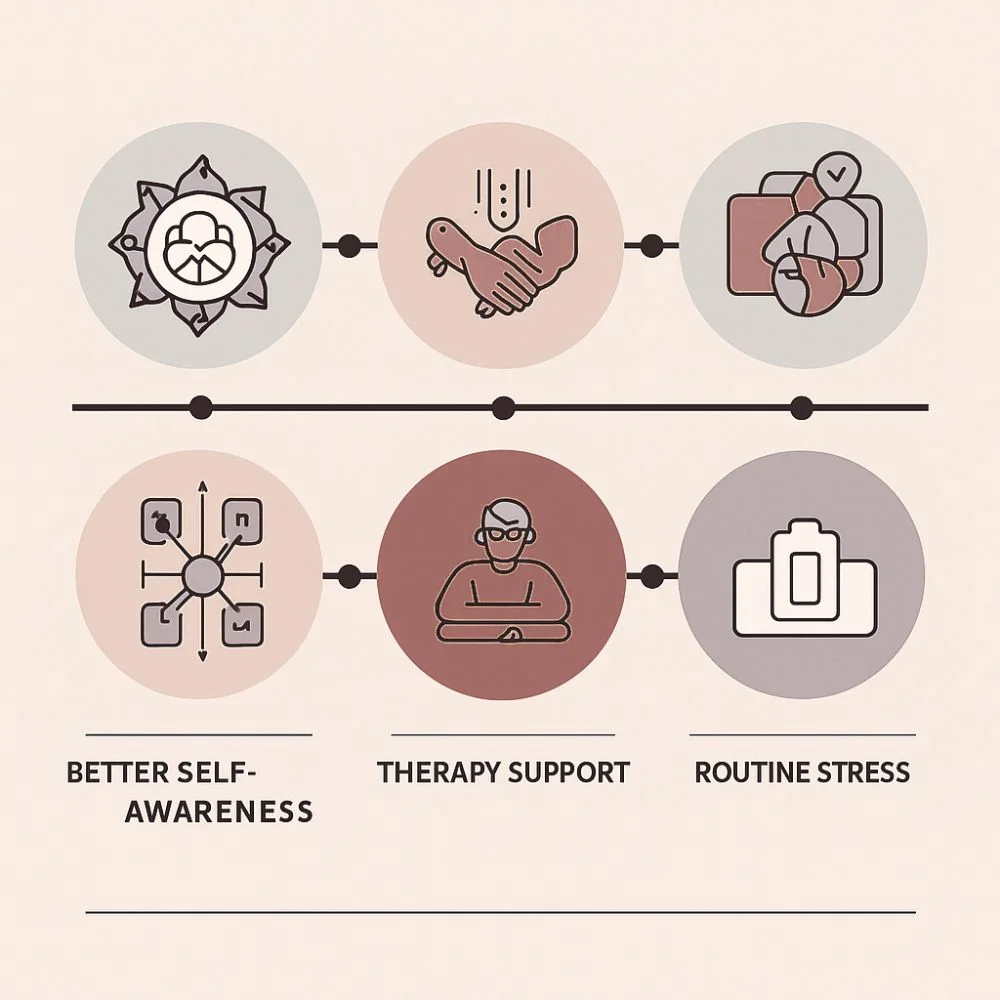Sometimes we feel anxious, stressed or not quite like ourselves, but it’s hard to figure out why. That’s where mood tracking apps can really help. They offer a simple, everyday way to stay connected with how you’re feeling and gain better control over your mental well-being.
With so much happening every day, it’s easy to ignore how we really feel. Mood tracking helps you notice changes early and manage them in a healthy way.
These apps are made for regular people, not just for those in therapy or with mental health conditions. You don’t need any special training or long hours. Just a few minutes a day using your phone can help you better understand your emotions.
Why Tracking Your Mood Matters?
Your emotions impact everything, your decisions, your energy and how you relate to others. But moods are tricky. One moment you’re calm, the next you’re frustrated or sad. This can be caused by things like poor sleep, skipped meals, stress at work or even the weather.
When you track your mood daily, you start to:
- Understand what lifts your mood or drags it down
- Spot early warning signs of burnout, sadness or anxiety
- Explain your feelings more clearly to a doctor or counselor
- Reflect on your week and make healthier choices
- Build new habits like journaling, meditation or practicing gratitude
Little by little, this habit can help you feel more grounded and emotionally strong.
What to Look for in a Mood Tracker App?
The best mental health apps don’t feel complicated. They’re quick, friendly and made for everyday use. You want an app that’s easy to stick with and doesn’t take more than a few minutes a day.
Helpful features to consider:
- Simple mood logging (using emojis, colors or quick notes)
- Daily or weekly reminders so you don’t forget
- Graphs or reports that show how your mood changes over time
- Notes section to describe your thoughts or what happened that day
- Strong privacy protection for your personal data
- Bonus tools like sleep tracking, relaxation guides or inspirational quotes
Many of these apps are free, with optional upgrades if you want more tools.
Top Mental Health Apps to Track Your Mood
![]()
Here are some trusted apps that people around the world use to track their mood every day.
1. Daylio Journal
Daylio is very beginner friendly. You log your mood using simple faces and add what activities you did, like working, relaxing, socializing or exercising. Over time, the app shows you which activities affect your mood most.
1. Why users recommend it?
- Quick and simple design
- Easy to track patterns with colorful charts
- Great for people who don’t like writing long notes
2. Moodfit
Moodfit is like a daily check-in for your mind. It not only tracks mood but also tracks habits that affect it, like exercise, hydration or sleep. You can also set daily goals to help boost your mental health.
1. Best for
- People managing stress or low motivation
- Tracking mood alongside healthy routines
3. Moodnotes
Moodnotes encourages you to reflect by writing a little more about your day. It helps you understand how your thinking influences your emotions and offers small tips to think more positively.
1. Useful for those who want to
- Learn about their thinking habits
- Feel more in control of negative thoughts
4. Bearable
Bearable is ideal if you want to track more than just emotions. You can track everything from your physical symptoms and diet to how well you slept, your daily energy and any medications you’re using.
1. Great choice for
- Anyone with physical or chronic health issues
- Connecting physical health to mental wellness
5. Reflectly
Reflectly helps you develop a mindful and uplifting daily routine through mood tracking. It asks easy questions about your day and gives motivational quotes to keep your spirits up.
1. Ideal for
- People who enjoy journaling
- Those looking for a calm, thoughtful routine
Tips to Build a Daily Mood Tracking Habit
Starting is easy, but the key is staying consistent. Try these simple ideas to blend it into your daily routine:
- Choose a set time each day, like after dinner or before bed
- Set a reminder so you don’t forget
- Don’t try to be perfect, just be honest about how you feel
- Use just a few words or an emoji if you’re in a hurry
- Check your weekly patterns to learn about your emotional cycles
Linking mood tracking to other wellness habits, like journaling or meditation, makes it even more helpful.
How Mood Tracking Supports Mental Wellness Goals?
Mood tracking apps are more than just digital diaries. They help build structure into your emotional life. Many users report feeling more in control after just a few weeks of consistent tracking. When you see your mood laid out visually, it’s easier to find what’s helping or hurting, your mental state.

4. With time, mood tracking helps
- Improve communication with loved ones by understanding your own feelings better
- Support therapy by providing real-life emotional data
- Reduce negative patterns by identifying emotional triggers
- Support routines that improve your mood, such as better sleep, staying active or practicing relaxation techniques
You become more proactive rather than reactive. Instead of being caught off guard by mood swings or stress, you start to see them coming and handle them early.
When to Seek Professional Help?
Mood tracking apps are great tools, but they’re not a replacement for professional care. If your mood is low for many days in a row or if you’re feeling overwhelmed and can’t manage on your own, consider talking to a therapist or doctor.
Some apps even offer suggestions for local resources or allow you to share your mood history with a healthcare provider.
Asking for help isn’t a weakness, it shows you’re taking care of yourself.
Final Thoughts
Taking care of your mental health doesn’t have to be difficult or expensive. By using simple, easy-to-use apps, you can start tracking your mood daily and take control of your emotional health. Whether you’re curious about your feelings, managing stress or trying to build better habits, mood tracking can help you feel more balanced and in tune with yourself.
Begin with small steps, be consistent and treat yourself with kindness along the way. Your mind deserves care, just like your body.



